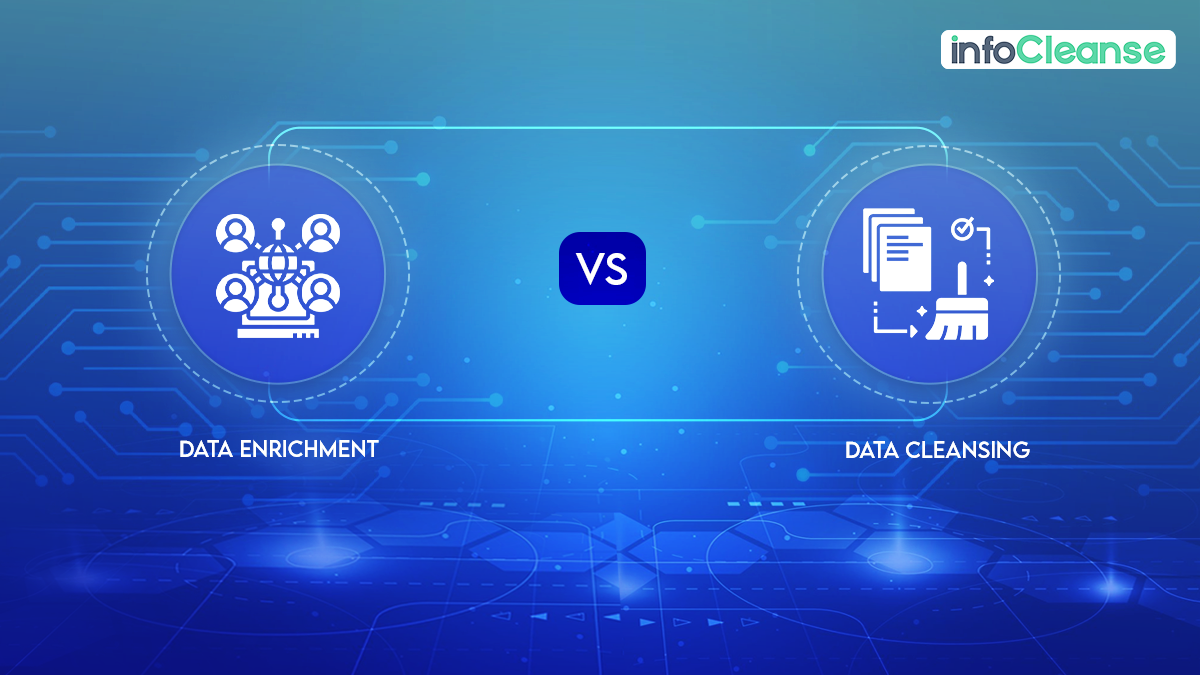
When referring to data hygiene, marketing has coined catchy phrases about the B2B sector, although their meanings can become a bit perplexing. Becoming familiar with data cleansing is simple; yet it is more difficult to appreciate the greatness of data appending and data enrichment, given their abstract nature.
According to former research director Mei Yang Selvage,
“Not only does bad data cost organizations financially, but deficient data quality practices also undermine their digital initiatives, weaken competitive standing and sow customer distrust.”
Keeping your data current helps to save you money, upgrade the efficacy of your organization, and better the customers’ perception. According to Ovum Research, because of bad data quality, companies lose approximately 30% of their revenue on average. According to Gartner, the average cost companies suffer annually because of poor data quality is about $9.7 million.
Data enrichment explains how to offer this improved business comprehension using high-quality data. When your business changes enriching data is a great strategy to use. This blog delves deep into the usage of data enrichment and data cleansing and how these two processes complement each other.
In the debate over data enrichment vs data cleaning, we’ll discuss data cleansing first. The process of reviewing and structuring data to make it appropriate for analysis is known as data cleaning. Data experts need to fix problems in the data to make them meaningful. These problems might be straightforward or complicated, easy or painful, or time-consuming and laborious.
Say you used various marketing strategies to create an email list. Data cleansing in this case would entail eliminating all the strange, fictitious email addresses from your list and erasing any duplicates. The following phase, data enrichment, may be started once all redundant information and errors have been found and eliminated. Data is used as marketing is data driven for every B2B firm.
It’s time to start using your raw data once you’ve confirmed its accuracy. Data enrichment belongs to the genre of data integration, which fills in the gaps to make an issue and its solution more evident. Data enrichment is the process of adding new properties and values from other data collections to one or more existing data sets.
Grouping all the internal data with the external sources data is what improves the overall data quality. Hence the data you get after this is enriched and this process is called Data Enrichment.
Richer data provide you with greater insight into your company and clients. It gives you additional tools to boost the visibility of your brand.
When we discuss data cleansing vs data enrichment, the former entails removing outdated or incorrect data. Along with that, it corrects discrepancies present in the data. Data enrichment, on the other hand, is the process of adding information from additional reliable sources to a dataset.
If you wish to start a data project, you may start by organizing your current data and eliminating any extraneous information. Data cleaning helps you identify duplicate, inaccurate, or insufficient data in your customer database. With third-party data, you can also add more trustworthy data to your current clean data.
Sometimes, companies ignore one, our suggestion would be to focus on both data enrichment and data cleansing.
According to a recent report, CRM software is used for sales and marketing by 91% of businesses with more than a few workers. Inaccurate CRM data stunts revenue, sales effectiveness, forecasting, and ultimately corporate growth.
Clean data is essential for lead creation, data-driven marketing, and the entire customer experience. You will not reach your marketing goals if your raw data is inaccurate.
Accurate client data has several advantages–
A significant portion of the answer to improved marketing is data. Every touchpoint relies on accurate and full client data that you can trust. Your mailing lists guarantee that the proper people and locations receive your direct mail. Your sales staff may make the initial call to the correct phone number.
Last but not least, you may more readily advance your marketing initiatives by penetrating the consumer’s thoughts. Deep learning techniques for data augmentation are enabling data cleansing and enrichment that is simpler, quicker, and more practical for marketing professionals. Data enrichment and cleansing become a continuous loop that you don’t have to worry about when you use automation and machine learning.
The customer experience and data analytics are both enhanced by better data quality. Additionally, by using machine learning techniques, you may avoid outsourcing to data augmentation providers and maintain all of your data inside. The recent report by InsideView, in conjunction with ClickDimensions, showed that a majority of respondents 71% placed a high value on the quality of their CRM data.
We’ve talked about data cleansing vs data enrichment and differentiated between them. Both ideas are essential to data management and data quality assurance because they assist to cleanse and fact-checking all of your data as it passes through the data pipeline.
Effective and ongoing data cleansing and enrichment are required to conduct meaningful analytics and make data-driven decisions.
Enterprises today navigate a complex business landscape combined with rapid technological evolution and fierce competition.…
In the ever-evolving B2B ecosystem, staying ahead of the curve is becoming a matter of…
From time immemorial, lawyers have played a crucial role in shaping our social fabric. With…
A pioneer in the automotive industry, the USA was the first country in the world…
The global software spectrum is so diverse and versatile that there is never any dearth…
What is the first thing that crosses your mind while visualizing a healthcare facility? The…